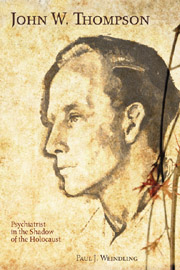Book contents
- Frontmatter
- Contents
- List of Illustrations
- Acknowledgments
- List of Abbreviations
- Part One Into the Dark
- 1 “Ecce Homo”
- 2 Mexican Childhood
- 3 Palo Alto Schooling, Stanford Student
- 4 Transatlantic Physiologist
- 5 Edinburgh Physician
- 6 Excitable Harvard
- 7 High Altitude and Rapid Descent
- 8 Auden, Anxiety, and the German Mind
- Part Two Redemption
- Part Three Aftermath
- Appendix John Thompson's Writings
- Notes
- Sources
- Index
8 - Auden, Anxiety, and the German Mind
from Part One - Into the Dark
Published online by Cambridge University Press: 12 September 2012
- Frontmatter
- Contents
- List of Illustrations
- Acknowledgments
- List of Abbreviations
- Part One Into the Dark
- 1 “Ecce Homo”
- 2 Mexican Childhood
- 3 Palo Alto Schooling, Stanford Student
- 4 Transatlantic Physiologist
- 5 Edinburgh Physician
- 6 Excitable Harvard
- 7 High Altitude and Rapid Descent
- 8 Auden, Anxiety, and the German Mind
- Part Two Redemption
- Part Three Aftermath
- Appendix John Thompson's Writings
- Notes
- Sources
- Index
Summary
Tour of Duty
In June 1943, F/L Thompson was sent by Air Commodore and Director of Medical Services J. W. Tice on a tour of duty in the United States. F/L Thompson was to report to the RCAF air attaché in Washington, DC, and to Col. Frank H. Wickhorst, head of Naval Aviation Physical Training. On July 1, 1943, he was at the target destination, the National Academy of Sciences, to represent the RCAF at the Subcommittee on Decompression Sickness of the American Committee on Aviation Medicine. The mission was a chance to visit friends, and—memorably—Wystan Auden. On Thompson's return to the Grant project, Arlie Bock commended the prodigal physiologist: “You never looked so well in your life, and I gathered that you felt that you were in the right spot to help win the war.” A mysterious friend, “Gladys,” presented Thompson with T S. Eliot's newly published Four Quartets on the eve of his presentation in Washington, DC. Here, he could read a motto for his life, for philanthropic medicine, and for the spiritual malaise of his age:
Our only health is the disease. …
The whole earth is our hospital
Endowed by the ruined millionaire, …
(11)
F/L Thompson observed that susceptibility to blackouts was more likely if an airman showed physiological effects of anxiety. At first, he spoke of this in terms of high, medium, and low susceptibility. However, his observations on the prevalence of anxiety met with skepticism. To gain credence for his observations, he had to quantify the notional proportions of those who blacked out.
- Type
- Chapter
- Information
- John W. ThompsonPsychiatrist in the Shadow of the Holocaust, pp. 76 - 86Publisher: Boydell & BrewerPrint publication year: 2010

